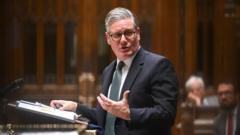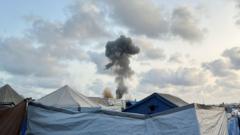Israel faced a stern rebuke from its allies, with major nations threatening concrete actions if military offensives and blockades continue.
Allies Urge Israel to Halt Escalation in Gaza Conflict

Allies Urge Israel to Halt Escalation in Gaza Conflict
Global Powers Express Concern Over Humanitarian Crisis Amid Ongoing Military Action
In a significant escalation of rhetoric, Britain, France, and Canada have united in demanding that Israel cease its military offensive in Gaza and lift the blockade on humanitarian aid. This joint warning marks one of the most severe criticisms from major Israeli allies since the onset of the conflict 19 months ago.
The British government announced the suspension of trade talks with Israel, reflecting increasing tensions over Israel’s actions, which they describe as “wholly disproportionate.” In a joint statement, the three countries expressed their deep concern over the alarming humanitarian situation, capped by a stark warning indicating that further measures would follow if Israel does not alter its current course.
Israel’s Prime Minister Benjamin Netanyahu countered the criticisms by accusing the allied nations of emboldening Hamas and undermining Israeli security. He referred to their actions as granting "a huge prize" to the militant group, which first launched attacks on October 7, sparking the prolonged conflict.
Meanwhile, speculation arises regarding the waning support from the United States. President Trump has yet to publicly condemn Israel’s renewed military actions and has noticeably avoided direct engagement with Netanyahu during his recent Middle Eastern trip, a move seen as a departure from prior diplomatic practices.
Compounding the urgency is a warning from a senior U.N. humanitarian official, Tom Fletcher, indicating that without immediate delivery of aid, thousands of infants in Gaza are at imminent risk of death. As the clock ticks, the appeals for intervention grow louder, underscoring the precarious state of civilians caught in the crossfire of ongoing hostilities.
The British government announced the suspension of trade talks with Israel, reflecting increasing tensions over Israel’s actions, which they describe as “wholly disproportionate.” In a joint statement, the three countries expressed their deep concern over the alarming humanitarian situation, capped by a stark warning indicating that further measures would follow if Israel does not alter its current course.
Israel’s Prime Minister Benjamin Netanyahu countered the criticisms by accusing the allied nations of emboldening Hamas and undermining Israeli security. He referred to their actions as granting "a huge prize" to the militant group, which first launched attacks on October 7, sparking the prolonged conflict.
Meanwhile, speculation arises regarding the waning support from the United States. President Trump has yet to publicly condemn Israel’s renewed military actions and has noticeably avoided direct engagement with Netanyahu during his recent Middle Eastern trip, a move seen as a departure from prior diplomatic practices.
Compounding the urgency is a warning from a senior U.N. humanitarian official, Tom Fletcher, indicating that without immediate delivery of aid, thousands of infants in Gaza are at imminent risk of death. As the clock ticks, the appeals for intervention grow louder, underscoring the precarious state of civilians caught in the crossfire of ongoing hostilities.




















